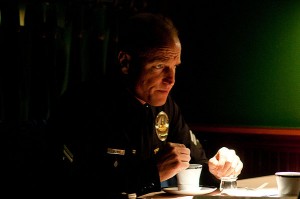
Owen Moverman’s Rampart is a powerful but flawed film that is both hard to like and impossible to ignore. A nightmarish, hallucinatory film, bathed in raw neon colors and with style to spare, and with a blistering central performance by Woody Harrleson, it’s the kind of movie that all but defies you to like it—almost as if it is indifferent to its reception. And despite its undeniable quality, I fear it’s a film that isn’t destined to be terribly popular. That’s a shame, too, because even though it goes on too long for its own good and simply stops more than it actually ends, it’s built on such bold and accomplished filmmaking that it really should be seen.

The film—cowritten by Moverman and renowned crime novelist James Ellroy (who is probably responsible for the pitch-perfect dialogue)—is in essence a portrait of police officer David Brown (Harrelson) as his life spirals out of control. Brown is anything but a good police officer or a good man. He’s a bullying racist, a sociopathic vigilante with a uniform. He’s a remnant of the LAPD at its worst, a hangover from the scandals that had plagued it for years. The film is set in 1999, right after the Rampart scandals of widespread police corruption. Brown—who is of the opinion that everything a cop is taught at the police academy is wrong—is the last thing the department needs. Nothing we see him do in the course of a day’s work could be construed as admirable—from “buzzing” groups of Latinos just to see them run to abusing his fellow Vietnam veteran, the wheelchair-bound “General” (Ben Foster).
Brown’s personal life is no better. He has two ex-wives (Anne Heche and Cynthia Nixon), who also happen to be sisters, and a daughter from each. He seems to delight in getting them all together around the dinner table to lord over them—or attempt to—his patriarchal authority. One can only conclude that this is his twisted notion of family life. Yet there seems to be no emotion in it—apart from playing the authority figure. There’s never any real sense that he particularly cares for any of these women, but he’s determined to keep them all together.

Things take an extremely bad turn for Brown when a car broadsides his patrol cruiser. He will later claim that he got out of his car and attempted to help the other man. It looks more like he gets out of his cruiser in a rage, but what matters is that the man runs—and when Brown catches up with him, he savagely beats the fellow. And every bit of it is captured on video by a passerby. As a result, his half-hearted protestations don’t play very well—nor, for that matter, does his swaggering attitude that he can’t be touched. He is from an era where anything a policeman might do was excused, or possibly even be praised. But that era is gone and he can’t seem to realize it. At the same time, he’s fully prepared to play every card in the deck, especially those involving Vietnam and PTSD. It’s so obvious that he doesn’t believe his own argument that internal-affairs investigator Joan Confrey (Sigourney Weaver) asks him at one point, “Can we please not go to Vietnam today?”

This, however, is only the beginning of where Brown’s arrogance and complete faith in a dismantled old-boy network will take him on his descent. Sequence after sequence drags him further down into the mire of his own making in a progression that is almost phantasmagoric. The lurid, ghastly, obviously enhanced colors make it seem ever more an unreal, separate world. The sequence where Brown is being questioned by Bill Blago (Steve Buscemi) is done in a series of swirling camera movements, and it’s one of the most strikingly constructed scenes I’ve seen in a while. All of this is held together by Harrelson’s compelling performance. As I noted at the outset, the film is far from perfect, especially toward the end—though even there there are moments of brilliance, like Brown’s final meeting with an incorruptible police official (Ice Cube)—and the fact that its ending just isn’t satisfactory. But overall, this is such a powerful, well-made film that I’m inclined to cut it some slack in this regard. Rated R for pervasive language, sexual content and some violence.




Oren is one of my favorite directors working right now. Sounds its just as powerful as The Messenger.
Where is this playing? I don’t see it on any local websites.
Opens Friday at The Carolina.
Do you think it will last more than a week or should i try and catch it this weekend?
So would a double-bill featuring this and Bad Lieutenant be overdoing it?
Very possibly.
Do you think it will last more than a week or should i try and catch it this weekend?
I have no idea. The fact that the distributor is also opening this obviously limited interest movie at the Carmike as well has very probably cut the pie too small.